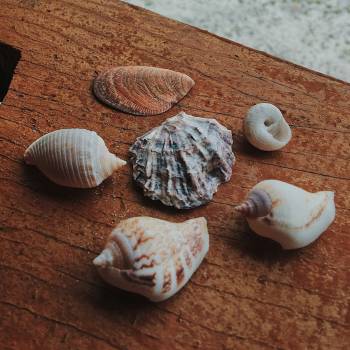بسم الله الرحمن الرحيم
Rasulullah salla Allahu ‘alayhi wa sallam (ﷺ) had many names. Each of those names reflect his ﷺ beautiful characteristic that we, as his ummah, should strive to understand and be inspired of.
Among the names of Rasulullah ﷺ are mentioned in the following hadith, where he ﷺ said:
“I am Muhammad, and I am Ahmad, and I am al-Mahi by whom unbelief would be obliterated, and I am al-Hashir at whose feet mankind will be gathered, and I am al-'Aqib after whom there will be no Prophet.”
[Sahih Muslim 2354a]
Let’s look at the meaning of these five names:
(1) Muhammad — It means someone who is the most worthy, and the most deserving of praise, and how precise is the meaning of this name. Rasulullah ﷺ has the noblest qualities among all mankind, of which even other Prophets ‘alayhumus-salaam do not exceed. Allah subhanahu wa ta'ala says in the Qur’an: “And verily, you (O Muhammad) are of an exalted (standard of) character.” [Surah al-Qalam 68 : 4]
From this we learn the importance of having husnul-khuluq (beautiful character). Rasulullah ﷺ said: “Verily, Allah does not look at your appearance or wealth, rather He looks at your hearts and actions.” [Sahih Muslim 2564c]
So in our quest to seek the rida (pleasure) of Allah through numerous acts of worship, don’t neglect our character towards others. The sunnah of Rasulullah ﷺ is not just limited to ‘ibaadah (acts of worship), but his akhlaaq (character) as well. For example, Rasulullah ﷺ was generous with his smile, and was approachable by anyone regardless of background, skin colour, or economic status. Similarly, our family members, friends, and community should feel at ease when approaching us. Don’t reserve our smile and friendliness to only a certain clique, or the rich and the affluent.
(2) Ahmad — It means someone who praises Allah subhanahu wa ta'ala the most. And indeed, Rasulullah ﷺ praised Allah in each and every second of his life, to the point that his feet would become swollen due to his extensive worship. Even in severe hardships and extreme difficulties, he ﷺ would never tire of praising and glorifying Allah. Rasulullah ﷺ said:
“Verily, the best servants of Allah on the Day of Resurrection are those who constantly praised Him.” [Al-Mu’jam al-Kabir 254 | Graded Sahih by al-Albani]
I remember a post where Sheikh Assim Alhakeem shared an incident, where he met someone who was tired from taking care of his children, and having to go to work every day. So the Sheikh gave him this beautiful advice:
When you sit with your family, praise Allah, as there are those who wish for what you have.
When you wake up early for work, praise Allah, because there are those who are jobless and wish for what you have.
When you are tired from doing groceries and household chores, praise Allah, for there are those who are not physically fit or not financially-able like what you have.
When you drive your car, or walk down the streets, praise Allah, because millions live in fear and under oppression, and they wish for what you have.
And when you finish praying two raka'aat, praise Allah, because there are millions of people in the grave wishing for what you have (i.e. the ability to do more good deeds).
As long as our hearts still beat, there is always something to be grateful for.
(3) al-Mahi — It means the obliterator of shirk. This is because Rasulullah ﷺ was sent during a time when disbelief was at its peak. With the help and hidaayah from Allah, and then through the da’wah of Rasulullah ﷺ, countless people have abandoned shirk and embraced Islam. This was Rasulullah’s ﷺ life mission, which he carried out under the Commandment of Allah, and out of love he had for mankind. Allah says:
“It may be that you (O Muhammad) are going to kill yourself with grief because they do not become believers.” [Surah ash-Shu’araa’ 26 : 3]
Imam Ibn Kathir rahimahullah commented that Rasulullah ﷺ was so keen for the people to be guided, that it caused him so much grief when they refused to accept his da’wah. So Allah ta'ala consoled Rasulullah ﷺ in this aayah, saying: Do not destroy yourself with regret, O Muhammad ﷺ.
Rasulullah’s ﷺ da’wah was carried out for the sake of Allah ta’ala, but it was also carried out with hikmah (wisdom) and out of genuine concern. Our da’wah should call people towards Islam, not repel them. Allah says: “Invite ˹all˺ to the Way of your Rabb with wisdom and kind advice, and only debate with them in the best manner. Surely your Rabb ˹alone˺ knows best who has strayed from His Way and who is ˹rightly˺ guided.” [Surah an-Nahl 16 : 125]
So use hikmah in our da’wah and dealings with others. This is truly one of the forgotten sunan (plural for sunnah) of Rasulullah ﷺ.
(4) al-Hashir — It means the gatherer. In Zaad Al-Ma’aad, Imam Ibn al-Qayyim rahimahullah wrote that this name implies that Rasulullah ﷺ was sent to gather all mankind on the land of assembly (al-Mahsyar). May we be amongst those who receive Rasulullah’s ﷺ intercession on the Day of Judgment.
(5) al-’Aqib — It means the last, and indeed he ﷺ is the final and the seal of Prophets, peace be upon them all.
Rasulullah ﷺ had other names, but these are five names that we should at least know of, for knowing his names is part of showing our love to Rasulullah ﷺ. And he ﷺ said:
“You will be with those whom you love (in the akhirah).”
[Sahih al-Bukhari 3688]
May Allah instil the correct love in our hearts towards Rasulullah ﷺ, and may we be gathered with him ﷺ in the highest level of Jannah.
Your sister in Deen,
Aida Msr
 Aida Masuri Mustafa
Aida Masuri Mustafa 





Intan Nur Atiqah Normila
Aida Masuri Mustafa